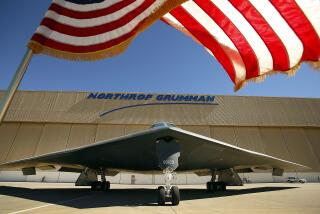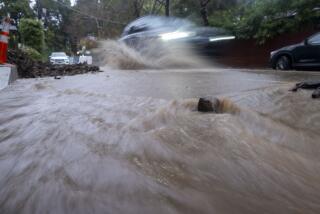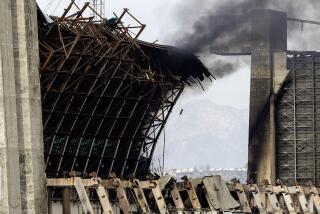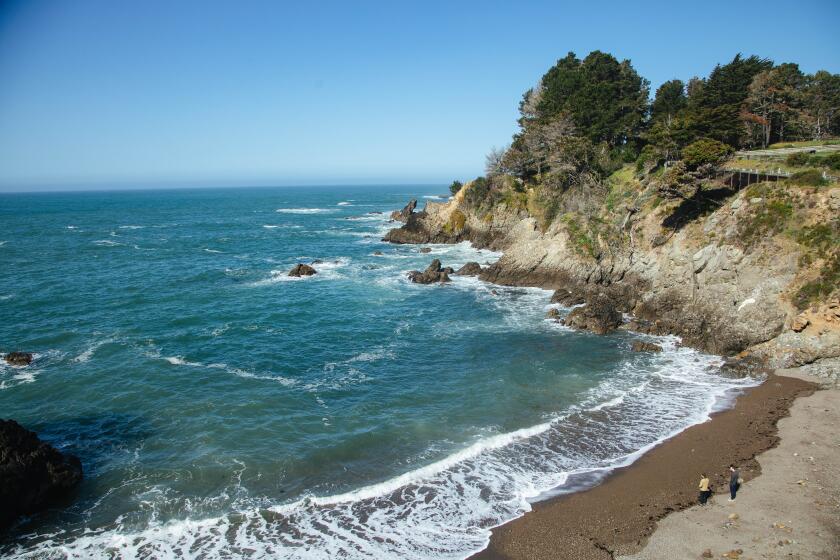Point Mugu on List of Threatened Bases : Military: Naval air station is among 32 additional U.S. installations considered for closure. Critics point to ‘devastating’ effect on area as well as logistical hurdles.
A federal commission on Wednesday added the Point Mugu Navy base to the Pentagon’s list of proposed military base closings, renewing fears among local leaders about losing Ventura County’s largest employer.
In a unanimous vote, the eight-member Defense Base Closure and Realignment Commission agreed to investigate whether transferring most of Point Mugu’s missile-testing work and jobs to its sister base at China Lake will save as much as $1.7 billion--as a hotly contested Pentagon audit suggests.
While alarmed, Navy and Ventura County leaders said Point Mugu is still many steps away from actually closing. They remained confident that the audit would be discredited and the base would be saved.
Nonetheless, the decision to target Point Mugu--along with seven other California bases added to the closure list Wednesday--stunned workers at the naval air station south of Oxnard that provides jobs for 9,000 uniformed and civilian employees.
“We were getting assurances from just about everybody that we weren’t even being considered” for closure, said Norman Seidenstock, a technical writer and Mugu civilian employee for more than 13 years. “So this was kind of a sneak attack.”
The revelation also shook up the business community that has long relied on Point Mugu’s hefty payroll and defense contracts to bolster the local economy. According to gross estimates, a shutdown would cost the county 18,000 Navy and spinoff jobs and $1.3 billion in yearly sales. As many as 19,000 residents would leave the area.
“If Mugu were to close, it would be devastating to the county,” said Cal Carerra, co-chairman of a local grass-roots task force set up to support local bases.
At a hearing Wednesday on Capitol Hill, commission staff argued that it makes sense to take a second look at the base, given the overlapping functions at Point Mugu and China Lake as well as the Pentagon assessment that huge cost savings can be realized by scaling back Point Mugu.
The Navy vigorously challenged numerous points in the study by the Pentagon’s inspector general and disputed that there would be any savings at all. The commission staff recently received a copy of the Navy’s point-by-point rebuttal but has yet to review it thoroughly.
Although supporters of Point Mugu were disappointed that the base was added to the list for scrutiny, they relished attacking the report that caught the commission’s interest.
“The bad news is that, for the moment, they’ve got ahold of something they think justifies taking a look at Mugu,” said Rep. Elton Gallegly (R-Simi Valley). “The good news is that this report is full of holes and bad information.”
Point Mugu’s backers will have an opportunity to make their case later this month when the commission schedules a special regional public hearing for West Coast bases. Members of Congress will have a separate hearing next month in Washington. At least one of the commissioners also will visit Point Mugu to gather additional facts.
In its deliberations Wednesday, the commission also decided to consider closing the two principal facilities at McClellan Air Force Base near Sacramento, the Naval Warfare Assessment Detachment in Corona, the Oakland Army Base, the Navy’s Fleet and Industrial Supply Center in Oakland, the Navy’s Engineering Field Activity in San Bruno and the office of the supervisor of shipbuilding, conversion and repair in San Francisco.
The California bases were among 32 installations nationwide that the commission added Wednesday to the Pentagon’s original list of 119 bases.
In proposing to add Point Mugu to the list, commission staffer Jim Owsley recommended preserving Point Mugu’s sea test range, which stretches for 36,000 square miles off the coast; maintaining the airspace now used to test missiles, and continuing to use the instrumentation installed in islands offshore.
But Owsley, a team leader on the commission staff, recommended closing or mothballing Point Mugu’s remaining runways, hangars and other facilities.
Under questioning from commissioners, Owsley said he had not figured out what would happen to the adjacent Channel Islands Air National Guard Base. If the runway were shut down, the National Guard’s 12 transport planes would have no way to take flight.
“If they mothball the runway and control tower, I’m not sure what we would do,” said Col. John Iffland, commander of the Air National Guard base. He said the guard was taken by surprise by the commission’s decision Wednesday and has no interest in abandoning its relatively new $76-million facility connected by taxiway to Point Mugu.
The airstrip’s closure would also detract from quick deployment of the Navy’s Seabee construction crews from the nearby Naval Construction Battalion Center at Port Hueneme. “The Seabee mission is to be able to mobilize quickly,” said Linda Wadley, spokeswoman for the Seabee base. “We’ve come to depend on Point Mugu’s airfield.”
Like many bases, Point Mugu has received a range of reviews, depending on who has studied it.
The Navy rates it second-highest in military value among its 64 technical centers--China Lake is first--and says its unique seaside geography makes it an ideal site to test missiles fired from aircraft.
U. S. Defense Secretary William Perry agreed with that assessment in March, when he spared Point Mugu from the closure list for 1995.
But commission staff have been intrigued by a June, 1994, report by the Defense Department’s inspector general that concluded the Navy could eliminate overlapping programs and save $1.7 billion over 20 years if it moved most of Point Mugu’s work to China Lake.
The 57-page audit, disclosed by The Times in November, acknowledged that there would be no net savings in the first five years after such a restructuring because it would cost $518 million to move Point Mugu facilities and redistribute most of its jobs to China Lake and Port Hueneme.
The Navy, which disputes the report’s numbers, has yet to issue its own estimates of the cost of such a restructuring. The base closing commission said it has asked the Navy to do its own economic analysis and expects to receive such a report soon.
“I predict that what they want to do will generate a horrific price tag,” said Adm. William E. Newman, a top Navy official who is in charge of Point Mugu, China Lake and other naval air warfare centers across the United States. “It will cost hundreds of millions of dollars.”
Newman questioned the accuracy of the inspector general’s report, which he said was written by auditors who lack the expertise to understand the highly technical world of weapons testing.
“The logic in the inspector general report was that the savings could come by eliminating about 2,000 people,” he said. But China Lake does not have the capability of absorbing the workload from Point Mugu, he said. “We don’t have large portions of the work force twiddling their thumbs.”
Point Mugu’s backers argue that such a transfer of testing functions would be logistically impossible and took exception to suggestions by commission staffers that Point Mugu was a “subordinate” facility to China Lake, saying the sister facilities are under joint command.
“China Lake and Point Mugu are welded at the hip,” said Adm. Dana B. McKinney, commanding officer of both bases. “We have so intertwined our organization of the last three or four years, it would be damaging to the China Lake operation if this were to happen.”
Some China Lake officials Wednesday had trouble restraining their jubilation over the potential windfall of jobs and Navy dollars at the expense of their sister base.
McKinney, who is based at China Lake, was quick to discourage that behavior and assure Point Mugu workers of his unwavering support.
He dispatched a two-page bulletin calling on workers at both bases to pull together to demonstrate to the base closing commissioners the importance of preserving Point Mugu. “I am confident that, in the end, the commissioners will see and understand the reasoning for keeping the Point Mugu site open,” McKinney said in the bulletin.
Spared during the initial round of cuts, Point Mugu and the 31 other installations added Wednesday now see their futures up in the air as the independent commission hones its final list for delivery to President Clinton by July 1.
Clinton can reject the entire package or send the recommendations on to Congress. Legislators would have the opportunity to vote for or against the list of proposed base reductions, although they cannot tinker with individual picks.
Former Republican Rep. Robert J. Lagomarsino of Ventura said the strong blow that California has already taken in previous rounds--22 bases have been ordered closed since 1988--coupled with the eight California bases added by the commission Wednesday, may help Point Mugu.
“Politically, it will never stand up,” said Lagomarsino, who was in Washington to attend the commission’s hearing on Wednesday.
Just how seriously at risk Point Mugu is remains difficult to gauge, say those who have followed past base shutdowns.
“Just because a base was added to the list today doesn’t mean it will close or be realigned,” commission chairman Alan J. Dixon stressed. “It means the commission believes a fuller evaluation of the base is a reasonable thing to undertake at this time.”
The good news for Point Mugu is that commissioners have tended to stick closely to the Pentagon’s recommendations. In the past two rounds of base closings, in 1991 and 1993, installations added by the commission have rarely made the final closure list.
Yet seven of the eight commissioners were appointed recently and are going through the process for the first time. Just how aggressive they will be in forging their own base closure list remains to be seen.
“The fact that they have added such an extended list indicates they are flexing their muscles,” said David Evans, a defense analyst with Business Executives for National Security. “They are clearly casting a wider net.”
In addition to Dixon, the commission includes Al Cornella, Rebecca Cox, retired Air Force Gen. J. B. Davis, Lee Kling, retired Navy Rear Adm. Benjamin F. Montoya, retired Army Maj. Gen. Josue Robles Jr. and Wendi Louise Steele.
Ventura County Supervisor John K. Flynn, who attended the hearing in Washington, noted the commissioners’ public comments before the vote was taken for signs of support for Point Mugu.
Davis called Mugu’s sea range a “national treasure” and questioned staff on whether it would be preserved. Montoya was the commissioner who asked about the Air National Guard base. Cox wondered about the staffing needed to run the sea range.
Flynn was momentarily encouraged by the attention.
But in the end, all of the commissioners agreed to add the Ventura County base to the list.
“At least they raised some questions about Point Mugu,” Flynn said, searching for a silver lining. “We have to raise some more questions of our own.”
He added: “At least we don’t have to deal with rumors anymore. There’s no doubt about it now. We’re on the list.”
Times staff writer Art Pine contributed to this story. Lacey reported from Washington, Weiss from Ventura.
* RELATED STORIES: B1
More to Read
Start your day right
Sign up for Essential California for news, features and recommendations from the L.A. Times and beyond in your inbox six days a week.
You may occasionally receive promotional content from the Los Angeles Times.






